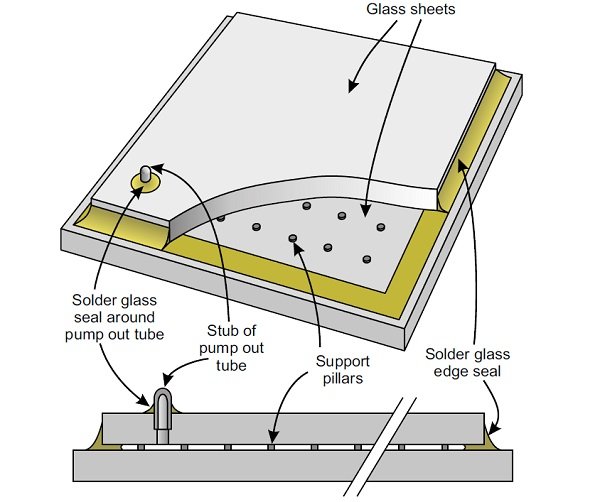Vacuum insulating
glass is mainly used in building envelope and industrial products (such
as freezer
doors, car and ship windows, etc.), and has to
withstand the repeated effects of sunlight and high and low temperature changes
during its lifetime. Te time to maintain its good performance is the key to the
survival and development of vacuum glass as an industrial product.

Vacuum glass is different from laminated glass or insulated glass that contain organic
materials:
- Laminated glass contain PVB or SGP interlayer,during its
lifetime,rain/temperature and humidity will affect the interlayer and
cause bubbles around glass edge,or delamination problem after years. - Insulating glass contains butyl and silicon sealant, the rubble
or sealant will aged and decrease its lifetime after years as well,IGU max
lifetime is 25 years. - Tempered
glass has no lifetime as well,it can work if only glass don’t break.
Different from above
normal architectural glass,vacuum glazing ,whether it’s sealed by glass solders
or metals,the glass component are inorganic materials, every component,whether
it’s sealing materials,glass itself,won’t get oxidized or aging after
years,so vacuum glass can serve 25-50 years.
The so-called
“vacuum glass lifetime” refers to the time that the high vacuum degree (≤0.1
Pa) in the vacuum insulating glass can be maintained.The main factors that
cause the working vacuum to drop are:
1.Leakage.
The periphery of the vacuum glass are sealed with low-melting glass powder
widely used in the kinescope industry.
The application practice for more than 80 years has proved that (the
black-and-white TV came out in 1939, and the color TV came out in 1953): this
sealing material is enough to meet the needs of Sealing requirements for
various electric vacuum devices such as tubes (the allowable leak rate of
electric vacuum devices is ≤10-12 Pa·m3/s).
2.
Gas The main
factors affecting the life of vacuum glass The glass surface and body contain a
large amount of gas. These gases are dissolved or adsorbed on the surface
during glass melting or thermal processing, about 102 Pa·L/cm3. Under the
action of external conditions such as temperature and light, these gases can be
desorbed from the glass surface,or diffused into the vacuum layer.
Heating and baking are the main methods of degassing glass in the electric
vacuum industry.Of course in our vacuum glass production,the sealing
temperature is 250℃-350℃,under this high
temperature the gas were removed from glass surface and inside and keep high
vacuum degree.
3.Getters.
In order to ensure the service life of the vacuum glass lifetime≥ 20 years, in
addition to the above measures, a long-term getter has been installed in the
vacuum glass to further improve the vacuum degree of the vacuum glass. The
application practice of electric vacuum devices represented by picture tubes
can prove that vacuum glass is a reliable and long-life static vacuum device.
Vacuum insulating glass produced by HaanGlas can reach 50 years,and offer
up to 10 years warranty.
While be careful when handling,installing,and
avoid damage before installation.
HaanGlas is your turnkey vacuum glazing
manufacturer and supply,kindly contact us for your next great project.
Contact us:
Location: 501,Sweetome,NO.2
Dongyue Ave,Taian city,Shandong Province,China
Mail: [email protected]
Website: https://www.vacuum-glass.com/vacuum-glass-solutions/
Mobile: + 86 17705464660